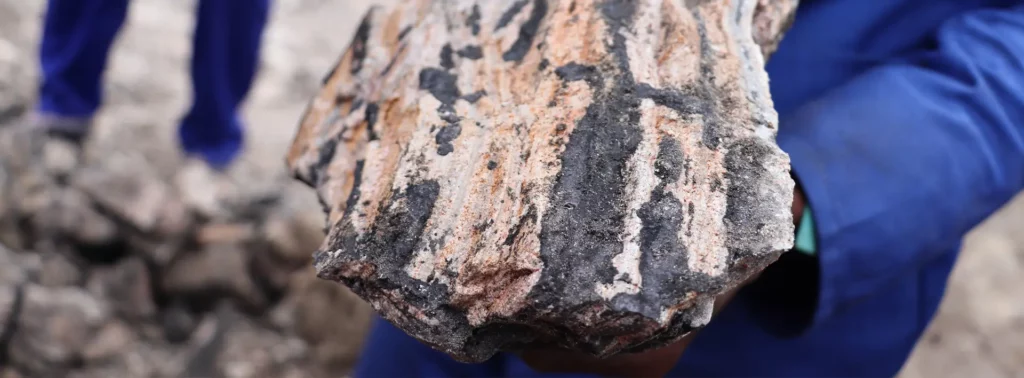
We have big plans for fair materials by 2030
Our new Fair Materials Roadmap 2030 extends our list of focus materials from 14 to 23 materials. With this, we take our fair material sourcing to the next level and challenge the industry to step up in addressing some of the biggest challenges we are facing.
More than 10 years ago, Fairphone started out to prove that it is possible to create a smartphone with materials that are not just “conflict-free”, but that also benefits the people mining these materials. We have come a long way since then: In 2017 and in 2021, we released our initial Fair Materials Roadmaps, putting a focus first on 10, and then on 14 materials with the highest social and environmental impacts. By the end of 2023, we surpassed our goal of an average 70% fair focus materials in the Fairphone 5, created improvements in the supply chains of all 14 focus materials, and started applying our fair materials approach to our other devices like the Fairbuds XL.
At the same time, the questions around our use of resources and its impact on people and planet have only gotten bigger in recent years.
Demand for materials is increasing – and so is its impact
The electronics sector is one of the world’s largest and fastest growing industries. And our industry’s business model still relies on selling more products faster, consuming more and more materials. This comes on top of the increasing demand for minerals driven by the need to transition to renewable energy sources. The global economy already uses a huge amount of extracted resources, and only 8.6% of this is currently recycled back.
This makes it difficult to achieve a circular economy. The supply of recycled materials cannot meet the fast-growing resource demand, meaning mining will expand in the coming decades. This will likely have negative consequences for people and planet. We’re talking pollution of air, water and soil, increased CO2 emissions, as well as adverse effects on the health and livelihoods of both the workers and the communities living near mines and processing plants.
At the same time, recycled materials also come with their own challenges: Recycling rates are still low for many materials, especially from end-of-life electronics. Using more recycled materials industry-wide does incentivize more recycling, but there is a lot more we need to do to increase the pool of recycled materials available. In addition, recycling value chains can also be opaque and informal, with 83% of e-waste treatment being unknown and 35% moved across borders with no oversight.
What we drive: Fair Circularity
We want a fair transition to an inclusive circular economy. We call it: Fair Circularity. This means being accountable for our material footprint and caring for people and planet in the entire product life cycle, across all levels of circularity. First and foremost, we focus on reducing demand for raw materials – and changing the electronics business model to design for longevity, repair, reuse and recycling.
In a second step that is just as crucial, the focus is on the responsible sourcing and use of raw and recycled materials that benefits the communities linked to their production, processing and manufacturing; all while protecting and regenerating nature.
We ask ourselves: How can we make sure that the countries producing and processing raw materials benefit? How can workers extracting the minerals, and communities and indigenous peoples living nearby, benefit – and not just be left with the negative social and environmental impacts? If we move increasingly to recycled materials, how can the countries, workers and communities involved in recycling benefit appropriately as well?
Our industry has the responsibility to think holistically about sustainable material use. Our new Fair Materials Roadmap provides a blueprint to address this challenge, and will guide us in transparently telling the full story of our material footprint in the next years.
From 14 to 23 focus materials
With our new roadmap, we extend the list of our focus materials from 14 to 23. We based this selection on a thorough and transparent assessment methodology: Out of over 60 materials used in the electronics sector, these focus materials have the biggest impacts on people and planet and the highest need for improvements.
To define our strategies to mitigate the negative impacts and creating positive impacts in the supply chains of these key materials, we conducted further analysis, considering: For each of these 23 materials, we now aim to dig deeper into our supply chains and engage with suppliers, workers, miners, recyclers and communities to determine what needs to be done. On a high level, we already identified a few key topics where Fairphone can contribute to thought leadership in fair material sourcing, and provide an example for the industry: Ensuring living income and living wages in mining Enhancing worker and community voice Nature protection and regeneration Recycled plastics innovation and upcycling Investing in and sourcing from fair small-scale recycling (waste collectors) We are still very far from truly fair and circular business models. That’s why we would love for our industry peers to join our journey towards Fair Circularity. How can they do that? The electronics industry has a key role to play in ensuring that demand for precious resources is reduced, and that our resource use is fair and just – benefitting workers, indigenous communities, local economies, and protecting nature. We have seen some progress in the past few years, especially when it comes to the use of recycled materials. But there is a still a LOT that needs to be done.
Mined materials
Recycled materials
Investing in and sourcing from artisanal- and small-scale mining
Fair sourcing of recycled materials – with a focus on batteries
Share this post
The post you are currently reading is an AMP HTML document; an optimized version for mobile usage to increase loading speed and decrease data usage. To see our full website you can visit our own mobile version of this post.